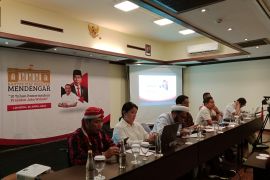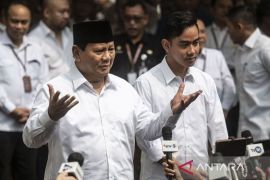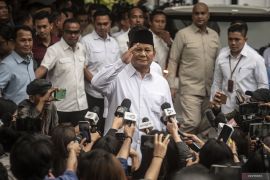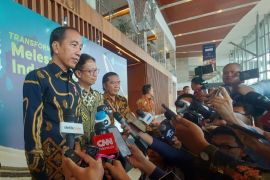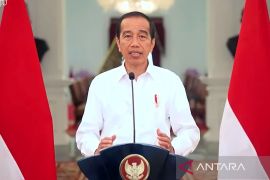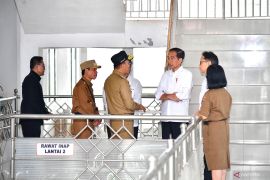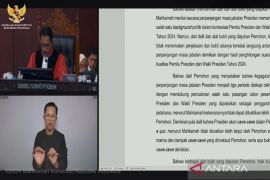Jokowi said that although the world`s economy is still slowing down, the country`s economy is still able to grow 5.02 percent to make it the third best after China and India.Jakarta (ANTARA News) - President Joko Widodo explained about his economic policies to improve equal distribution to Muslim clerics during a Peoples Economic Congress (KEU) held by the Indonesian Council of Ulemas (MUI) here on Saturday.
"The gap ratio or the gini ratio, as we can see, now is at 0.397. Compared to last year, it is already down a little, but we hope it will still decrease," he stated while opening the congress.
Jokowi, as he is popularly called, said that although the worlds economy is still slowing down, the countrys economy is still able to grow 5.02 percent to make it the third best after China and India.
"We must be grateful for it. However, it also needs scrutiny to check who has really enjoyed the 5.02 percent growth. This needs to be monitored in detail," he stated.
Jokowi admitted that he had already met the chief of MUI and board members several times to discuss peoples economy or the economy of the ummah.
He noted that he had almost every week visited the regions to understand the needs of the ordinary people.
"Almost every week for three or four days, I visit the region, including villages and hamlets. Hence, I know well what the grassroots economy, including farmers, small fish pond farmers, and small fishermen expected, so that they can enjoy a part of the national economy," he said.
In view of that, the government has produced two big policies, which include assets distribution and agrarian reforms and partnership, to assure equitable economic distribution, he remarked.
Jokowi added that so far, only 46 million certificates have been produced, while there are 126 million plots of land across the country needed under the asset redistribution and agrarian reform program.
"It means that more than 60 percent of land in our country has not yet been certified. During my inspection to villages, I realized that, because people did not have money for it," he said.
He stated that he had ordered the minister of agrarian affairs/head of National Land Agency to increase the target of land certification to 5 million a year from merely only 400 thousand certificates so far.
He pointed out that 7 million land certificates must be produced in 2018 and 9 million, for small fish pond farmers, peasants, fishermen, and tricycle drivers, must be produced in 2019.
"We have started it recently in the district of Boyolali, totaling 10,055 certificates, and it will be continued," he asserted.
Jokowi said that he has always set targets that must be met by his ministers.
"The targets must be achieved; If they are not, well, there will be a problem. They may be replaced. I speak frankly. I also do it with my ministers. They may be replaced, dismissed, or others," he reiterated.
The president warned that unless targets are set, none of the 126 million plots of land could be certified.
"Imagine, if only 400 thousand certificates are produced a year, how many years will it take for the land certification to be finished?. This will make people unable to access capital from sharia banks, venture capital agencies, or other banks as they have no asset to be used as a guarantee," he revealed.
He added that a certificate is a property right that the state gives to the people in all countries. Using this, people will have an opportunity to access financial institutions.
He said that currently, the government had collected 12.7 million hectares of forests and 9 million plots of land for distribution.
"Again, it must be understood that asset redistribution and agrarian reform are not land distribution. I do not like to distribute land to be only sold by the people to the rich later," he stated.
Jokowi hoped that the congress could give inputs regarding asset redistribution so that "decisions could be made immediately and asset redistribution done to the people, cooperatives, and Islamic boarding schools to reduce gap."
Regarding partnership, he noted that he has sent several ministers to talk to big companies so that they would build partnership with micro-, small, and medium businesses.
"A win-win partnership is one that gives mutual benefits, although big businesses are expected to take smaller benefits, while the micro-, small, and medium businesses are expected to achieve bigger ones or even nothing," he revealed.
Jokowi remarked that some big companies have already expressed willingness, but he hoped there would be bigger partnerships which would benefit the people later.
"We hope this will be discussed and formulated so that we will have detailed inputs to make us able to summon, decide, and implement it; and connect people and products with companies. This is what we are going to do," he asserted. (*)
Editor: Heru Purwanto
Copyright © ANTARA 2017
